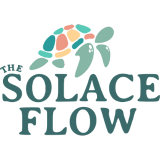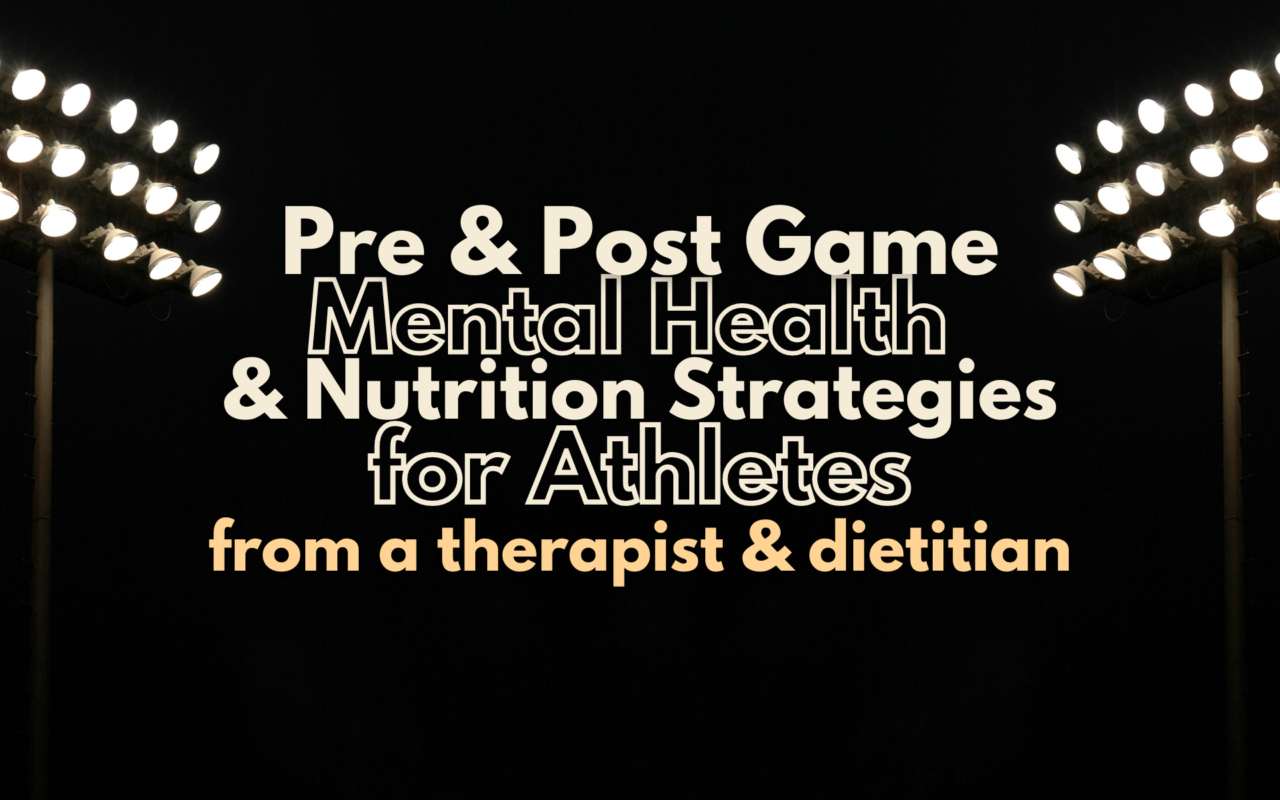A Therapist and Dietitian’s Guide to Pre and Post Game Mental Health and Nutrition Strategies for Athletes
Hello readers! It is Shailyn Waites, founder of The Solace Flow (@thesolaceflow), back for another blog post. For those who are new here, I am a therapist and former varsity athlete, who specializes working with athletes in sport and transitioning out of sport, as well as complex trauma. I am really excited for today’s post as we have a guest writer, Kaitlyn Franklin (@nourishingthewholeperson), who is a Registered Dietitian that specializes working with athletes, eating disorders, mind-body connection, and intuitive eating. We collaborated on today’s post to discuss pre and post game mental health and nutrition strategies for athletes, so let’s dive in!
Pre-Game Mental Health Support:
Engaging in pre-game mental health support is as essential as physical preparation. Here are some key practices to build confidence and awareness before stepping into a game or competition.
Positive Affirmations and Visualization:
- Create positive affirmations related to your skills, achievements, and capabilities. Visualization exercises, where you vividly imagine successful performances, can significantly enhance confidence and focus (this can be done in therapy sessions too where your therapist guides you through this!).
- Example: Before a soccer match, a player can repeat affirmations like “I am a skilled and resilient athlete” and visualize themselves making precise passes and scoring goals.
Acknowledge Achievements:
- Reflecting on past achievements creates a sense of accomplishment. It can be helpful to create a list of your proudest moments and review it before each game. This exercise helps increase confidence by reminding you of your capabilities.
- Example: A basketball player might recall their successful game-winning shot or an outstanding defensive play to reinforce a positive mindset.
Post-Game Mental Health Strategies:
Post-game rituals are equally crucial for an athlete’s mental well-being. Here’s how athletes can embrace self-compassion, a growth mindset, vulnerability, and reflection after the game.
Self-Compassion Practices:
- After a tough game or defeat, practice self-compassion. It is important to acknowledge your efforts, regardless of the outcome, and treat yourself with the same kindness you would offer a teammate.
- Example: A tennis player may acknowledge that they gave their best effort on the court and recognize the areas for improvement without self-criticism.
- Even pros make mistakes!! It is how you handle the mistakes that makes you elite.
Embrace a Growth Mindset:
- Cultivate a growth mindset by reframing setbacks as opportunities for learning and development. Viewing challenges as stepping stones to improvement rather than obstacles to success.
- Example: A swimmer who did not achieve their desired time can view the race as a chance to identify areas for improvement and set new goals for future performances.
Vulnerability and Reflection:
- Embracing vulnerability by sharing your thoughts and feelings with trusted teammates or coaches or in a therapy session. Reflection on both successes and challenges provides valuable insights for personal growth.
- Example: A golfer may discuss their emotions with their therapist to acknowledge, label, and release the emotions and move forward towards goals to improve areas of challenge.
Athlete Nutrition
Eating before, during, and after activity is important for any athlete and their performance. Well-timed and planned meals and snacks help keep an athlete fueled and hydrated so they are able to perform at their best. Nutrition is important at all levels of sport and under-nourishing or under-fueling can lead to injuries and a decline in physical performance.
The Balanced Plate
In seeking peak athletic performance, understanding the role of macronutrients is essential.
Carbohydrates, both simple and complex, stand as the primary fuel source for athletes, providing the energy required for intense physical exertion.
Proteins, consisting of essential amino acids, play a pivotal role in muscle growth by facilitating repair and regeneration after strenuous workouts.
Fats play a crucial role in the absorption of fat-soluble vitamins—A, D, E, and K—contributing to overall nutrient absorption. Beyond their role as an energy source, fats are integral to supporting bone health and hormonal regulation.
To explore a comprehensive guide to an athlete’s nutritional needs, check out “The Athlete’s Plate” at https://swell.uccs.edu/theathletesplate. This resource offers valuable insights into creating a well-balanced plate tailored to the specific demands of sports and exercise, ensuring optimal fuel.
Risks With Under-Fueling
Insufficient fueling over an extended period can lead to the development of Relative Energy Deficiency in Sport (RED-S), a condition outlined by the International Olympic Committee (IOC) in 2014. RED-S encompasses a range of impairments affecting an athlete’s metabolic rate, menstrual function, bone health, immunity, protein synthesis, and cardiovascular well-being. The root cause of RED-S lies in athletes experiencing Low Energy Available (LEA) in their bodies for a prolonged duration. This occurs when an athlete’s energy intake through their diet falls short of the energy expended during exercise. The imbalance puts athletes at risk of RED-S. Thankfully, medical professionals can conduct screenings for RED-S and provide personalized interventions to mitigate the potential consequences of prolonged under-fueling. Early detection and appropriate measures are vital for ensuring the overall health and performance of athletes.
Pre and Post Fueling
Tailoring nutritional intake to the individual needs of athletes is crucial, recognizing that the quantity of food required can vary. A strategic approach involves consuming a well-balanced meal 3-4 hours before engaging in activity to ensure adequate fueling. Additionally, athletes benefit from a pre-activity snack 1-2 hours prior to the event, serving to replenish glycogen stores. A meal example showing this balance could consist of grilled chicken for protein, pasta as a carbohydrate source, enriched with red sauce for flavour, steamed vegetables for essential nutrients and fiber, complemented by a dinner roll with butter for additional carbohydrates and fats.
For pre-training snacks, options such as a granola bar, fruit cup, banana, or a carbohydrate-rich sports drink, or even a peanut butter sandwich can provide the necessary energy boost. It’s paramount for athletes to incorporate both carbohydrates and protein into their meals or snacks.
Post-activity fueling suggestions include combinations like fruit paired with Greek yogurt, a bagel with peanut butter and milk, or rice with lean meat and veggies. Timing plays a crucial role, with the recommendation to consume a post-activity meal or snack within 30 minutes if another strenuous activity is planned within the next 24 hours. However, if the subsequent activity is beyond the 24-hour mark, there’s no immediate need to refuel within that initial 30-minute window.
Recovery
Recovery is important for any athlete as it helps them prepare for their next day of training. Here are some tips on how to support recovery.
- Focus on hydration. Water and electrolyte replacements are needed for all athletes.
- Prioritize carbohydrate consumption to restore glycogen stores.
- Prioritize protein consumption to repair damaged protein/muscle.
- Take time to stretch, move and rest.
If you found this blog post helpful and would love to learn more please be sure to follow both @thesolaceflow and @nourishingthewholeperson on Instagram, or visit our websites below:
The Solace Flow: www.thesolaceflow.com
Nourishing The Whole Person: www.nourishingthewholeperson.com
We hope you enjoyed today’s blog post read, have a lovely day!!!
Shailyn Waites & Kaitlyn Franklin

References:
Reguant-Closa, A., Harris, M. M., Lohman, T. G., & Meyer, N. L. (2019). Validation of the athlete’s plate nutrition educational tool: phase I. International journal of sport nutrition and exercise metabolism, 29(6), 628-635. https://doi.org/10.1123/ijsnem.2018-0346https://doi.org/10.1123/ijsnem.2018-0346

